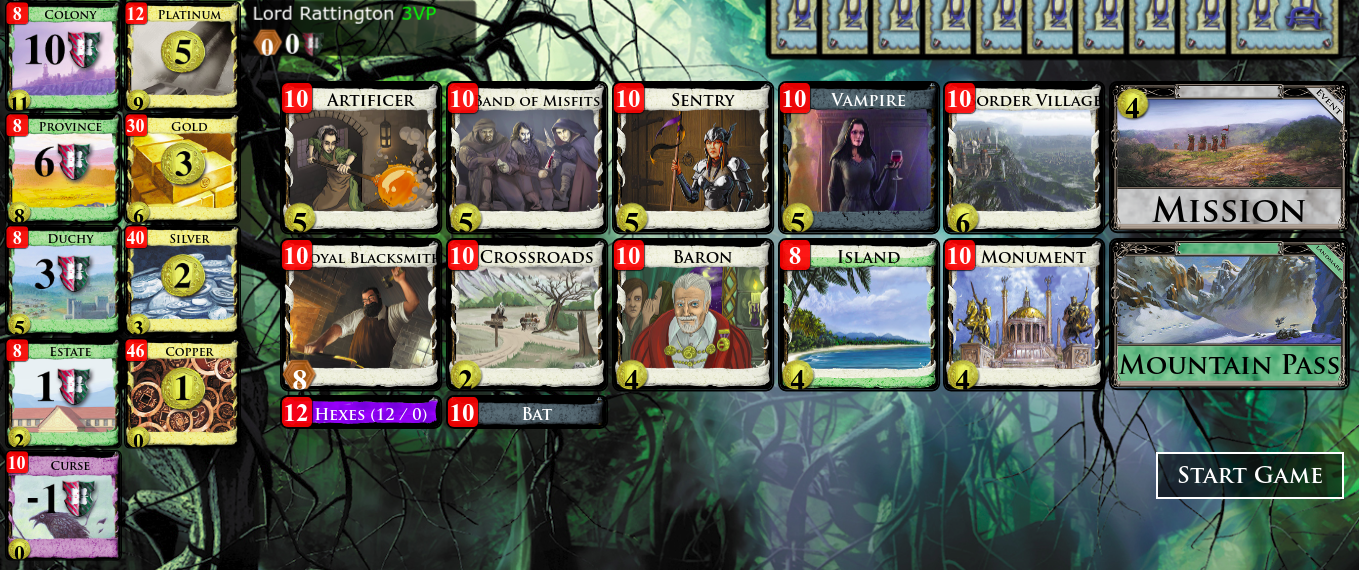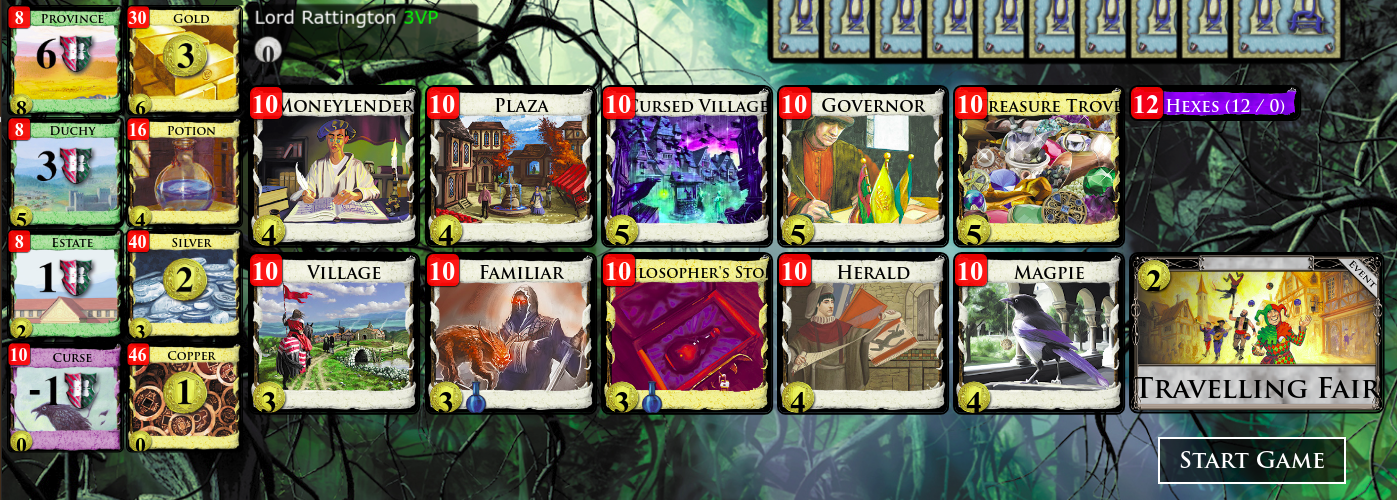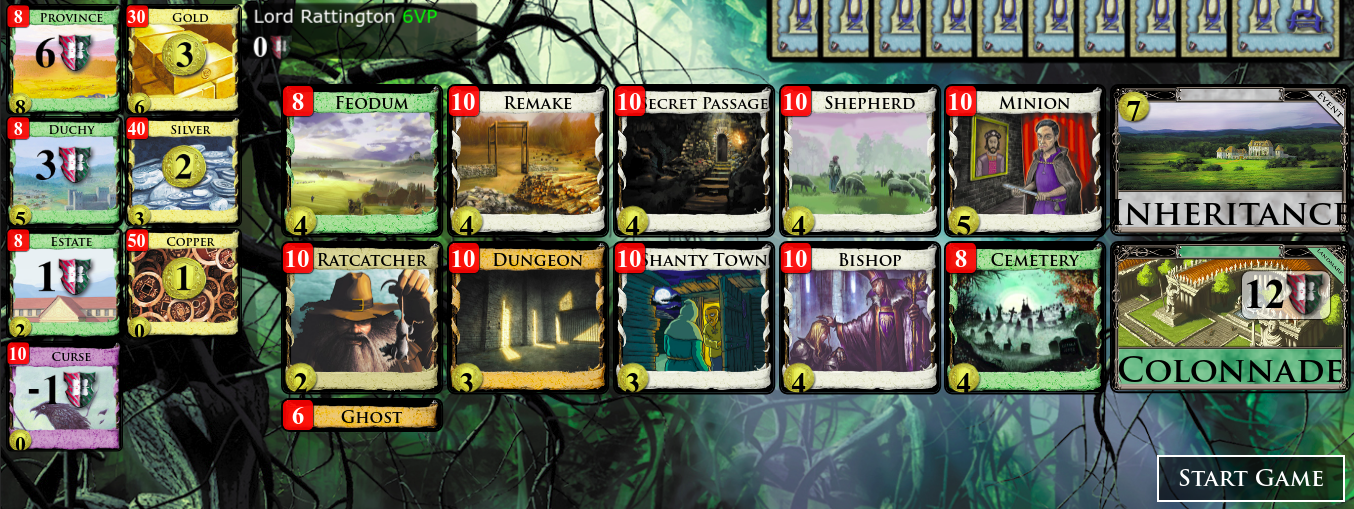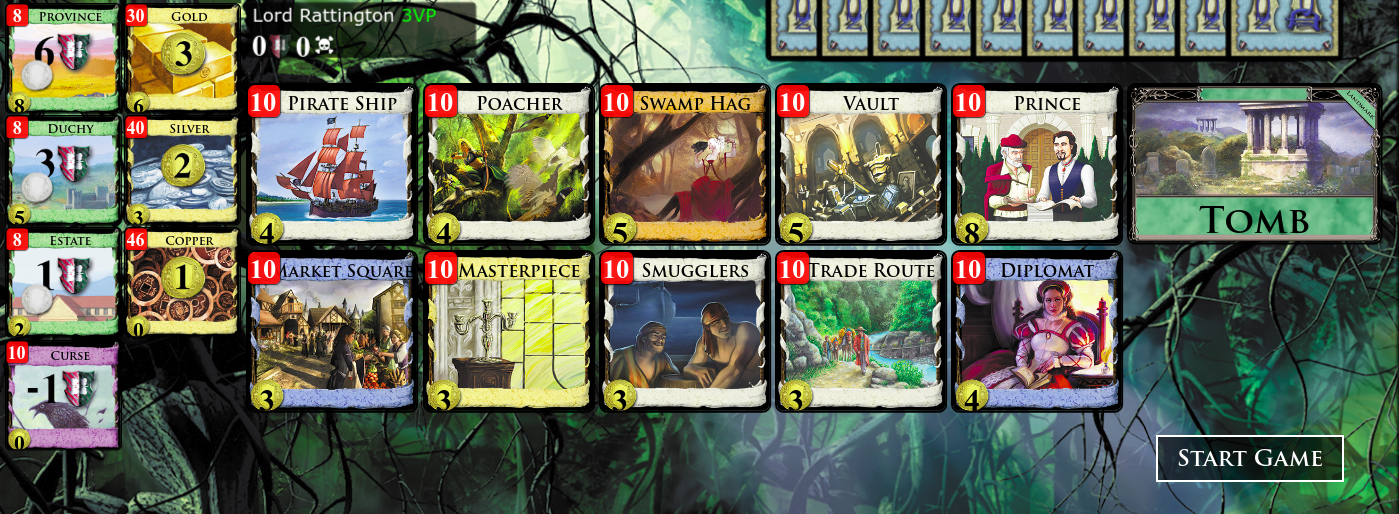Lately I’ve been playing Dominion Online in my free time, and this year I entered the single-elimination tournament. There are 254 participants, and I am seeded at 113. (Concretely, that means I’m very likely to get out in round 2.) But I did win the first round (best of 6 games), and I found it quite exciting.
If you play Dominion, you may enjoy trying to assess the boards I got in Round 1, below. Some of them are quite interesting :) I hid my own comments as spoilers, including my pick for “most valuable cards” based on my experience from the game, but there are probably some oversights that a more advanced player could identify. I lost game 4 and won the others.
If you don’t: Dominion is a deck-building board/card game1, originally released in 2008, now with a second edition and numerous expansions. An interesting core feature is that instead of crafting a deck first and then playing with it later, the actual gameplay consists of incrementally adding cards to your deck as you play. A second interesting core feature is that the cards available to be added to your deck are randomly chosen for each game, so there is extremely high variability from one game to the next. Two different starting setups can feel like completely different games; a card may be very powerful in one setup, but very weak in another.
1 I really dislike the confusing distinction between “board game” and “card game”. It’s a distinction I’ve never really figured out: many usages of “board game” implicitly include card games like Dominion in their scope, but the word “board” in the name seems to exclude them, discouraging the more general usage. As of today, I still don’t know what usage is more widespread. I didn’t actually google it, but I did notice that Wikipedia seems to distinguish carefully between board games and card games, except that the page for Card Game gives an even more confusing definition in terms of Playing Cards. Actually, this seems to be a more general problem with Wikipedia where it is great for specialized topics, but sometimes pages on really basic things give misleading definitions or just aren’t of great quality. Oh, right, sorry, the Dominion games:
Game 1

Spoiler:
Most valuable cards (including events and landmarks): Mission and Artificer, combined with Crossroads. Mission synergizes weakly with Royal Blacksmith (if you have +Buy you can essentially get one for 4 coins), and those enable a very powerful synergy with Artificer and Crossroads once you get the engine going -- capable of 3-5 colonies per turn including the extra Mission turn. This is because once you have a huge hand with a bunch of victory cards, you can discard all non-victory with Artificer to get a Colony, draw them back with Crossroads, and repeat. You also need Border Village for +Actions, Sentry for trashing, and Baron for +Buy.
My original plan was to open Baron for the +Buy, and to spike coins to get Sentry, Border Village, Royal Blacksmith. I also kept in mind Artificer as an option, especially with Mission. Early on, my Barons weren't hitting, so I wasn't getting the Sentries and Border Villages I wanted, which was a bad start. I invested in a few Crossroads instead, which may not have been good in the short term, but the card itself ended up being crucial to have. In the end, after the slow setup (i.e. getting enough Border Village and Royal Blacksmith and trashing the starting Coppers), Artificer + Mission + Crossroads was completely dominating. A minor mistake was buying a Band of Misfits at one point, a card which I think I literally never used (only ever discarded to Artificer). My opponent missed the Artificer synergies, opting for a more "normal" strategy with cards like Vampire and Sentry.
Game 2

Spoiler:
(Edited)
Most valuable cards: Familiar and Philosopher's Stone. Honorable mention to Magpie (a reliable lab in decks with lots of treasure). We both passed up Governor, but I expect that was a mistake (see below). I also ignored Moneylender, which may also have been a mistake.
My thought process: Ignoring Moneylender, the only trasher is Governor, and thus the only way to get rid of Curses and Coppers is to trash them for Estates. This is slow and unappealing, and moreover, in the process of doing this you give your opponent a free trash of a Copper or Curse, compared to your trading one dead card for another. Thus with the only trashing ruled out, Familiar becomes a must-buy as soon as possible, and we anticipate building a deck with 5 curses. We can rule out Herald (which is unlikely to hit reliably), Village (which has nothing to chain into), Cursed Village (which has no discard to combo with), and Plaza (the +actions won't be useful, and the discard-for-a-coin-token is good but not enough on its own to justify buying over, e.g. Silver and Magpie). This leaves us going for Big Money to set up 1 Province per turn, after the curses are gone. Philosopher's Stone looks to be quite strong with lots of Curses in the deck, and picking up Treasure Trove may be worth it for the extra bonus to Philosopher's Stone. Magpie is always good but even better with so many treasures in the deck. So Magpie + Treasure Trove + Philosopher's Stone looks great overall. Note that Curses and Magpies are certain to pile out, so a surprise 3-pile ending is a necessary consideration.
We both went for this same strategy: first Magpie and Familiar, and when the curses were out, Philosopher's Stone and a couple of Treasure Troves. Very soon, Philosopher's Stone became a province whenever it was drawn. The Philosopher's Stone supply went down to 2 (not quite a 3-pile ending), and I ended up winning probably due to having 5 of them to my opponent's 3 (but maybe also other factors).
In retrospect, it was probably worth picking up Governor on this board. It is powerful draw, and it can turn Golds into Provinces. Governor could also have facilitated an early 3-pile ending, although it can't do anything with the Potion-cost cards.
Game 3

Spoiler:
Most valuable cards: Shepherd and Inheritance. Also one of the trashers to get rid of Coppers (and Haunted Mirror) (not sure which trasher is best). Bishop is probably important to get at some point. There's no +Buy.
My strategy was roughly: Estate on 2, Silver on 3, Shepherd on 4, Gold on 6 (up to 2 Golds), Inheritance on 7 (picking Shepherd), and Province on 8. After buying Inheritance, Estate on 3 or 4. Alternatively with 6+, I bought Cemetery to trash Coppers. I also picked up a Bishop eventually which was crucial to trash remaining coppers, and also to remove Cemetery from deck (at no cost to VP).
My opponent tried a Minion strategy, eventually playing Inheritance on Ratcatcher. Minion doesn't make sense to me here compared to Shepherd, and my strategy won. But I may be wrong about Minion -- since there's no +Buy anyway, you merely have to reliably hit 8 every turn. Also, Remake and Ratcatcher feel like reasonable buys to me, to get rid of coppers.
Game 4

Spoiler:
Most valuable cards: Maybe Swamp Hag and Vault. The problem is that despite Tomb being on the board, trashing is very difficult (just Trade Route), so Swamp Hag dominates and hands out a lot of curses. From there, Vault is the only natural counter, as it enables getting Provinces pretty quickly even with all the junk in your deck.
I lost this game. I attempted Prince + Trade Route, but Prince was too slow and it didn't hit one of my Trade Routes in the next shuffle. We both got a lot of Market Squares and used them with Trade Route to get Gold. But since my opponent opened with Swamp Hag and got a couple of Vaults later on (which I had ignored), they won convincingly.
Game 5

Spoiler:
Most valuable cards: I'm going to guess Haggler combined with Keep. One problem with Keep is that an engine deck doesn't want too many treasure cards, so it has trouble competing with an opponent who has lots of treasure. But with Haggler, in the final turn every victory card comes with a free treasure card costing less than it, which lets you come out ahead with Keep. Other important cards were Urchin (Mercenary), King's Court, and Peasant (Teacher). Mercenary is super important early on as the only strong way to counter curses from Sea Hag (Cemetery is a possibility here, but less strong). Then King's Court and Teacher allow setting up an extremely powerful engine (Teacher needs a lot of copies of a certain card, in my case Blessed Village, but Mill seems possible too, or even Urchin).
I really thought I had lost this one; I was down 35 points before the last turn. I opened Urchin + Mill and soon bought a Haggler and another Urchin, but my opponent got Sea Hag. My Urchins never quite lined up early on and I got flooded with curses, for a very slow opening. I think a better open may have been Urchin + Urchin; it's really important to get the Mercenary as soon as possible in order to trash away Curse, Copper, and Estate. Anyway this was partly bad luck. I still think getting Sea Hag should not be important when Mercenary is on the table.
Due to this slow opening plus Keep on the board, I was sure to lose with only 2 provinces left. But at this point my Mercenaries had trashed everything, Teacher was giving Blessed Village +1 Card, and I had several King's Courts, so I actually closed this gap in a single turn, with several points to spare. The key was really King's Court and Haggler. By using King's Court on Peasant for +Buy, Haggler was able to pick up 5 Duchies + 5 Silver, thus winning the Silver pile for Keep. I didn't have enough +Buy to win the Copper pile, but my 2 Provinces + 2 Golds from Haggler was also enough to win the Gold pile, thus taking the win.